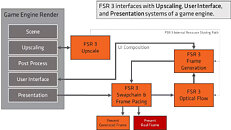- Joined
- Oct 9, 2007
- Messages
- 47,631 (7.44/day)
- Location
- Dublin, Ireland
| System Name | RBMK-1000 |
|---|---|
| Processor | AMD Ryzen 7 5700G |
| Motherboard | Gigabyte B550 AORUS Elite V2 |
| Cooling | DeepCool Gammax L240 V2 |
| Memory | 2x 16GB DDR4-3200 |
| Video Card(s) | Galax RTX 4070 Ti EX |
| Storage | Samsung 990 1TB |
| Display(s) | BenQ 1440p 60 Hz 27-inch |
| Case | Corsair Carbide 100R |
| Audio Device(s) | ASUS SupremeFX S1220A |
| Power Supply | Cooler Master MWE Gold 650W |
| Mouse | ASUS ROG Strix Impact |
| Keyboard | Gamdias Hermes E2 |
| Software | Windows 11 Pro |
AMD CTO Mark Papermaster confirmed that AMD is working on a new upscaling technology that leverages AI. A key technological difference between AMD FSR and competing solutions NVIDIA DLSS and Intel XeSS, has been AMD's remarkable restraint in implementing AI in any part of the upscaler's pipeline. Unlike FSR, both DLSS and XeSS utilize AI DNNs to overcome temporal artifacts in their upscalers. AMD Radeon RX 7000 series GPUs and Ryzen 7000 CPUs are the first with accelerators or ISA that speed up AI workloads; and with the RX 7000 series capturing a sizable install-base, AMD is finally turning to AI for the next generation of its FSR upscaling tech. Papermaster highlighted his company's plans for AI in upscaling technologies in an interview with No Priors.
To a question by No Priors on exploring AI for upscaling, Papermaster responded: "2024 is a giant year for us because we spent so many years in our hardware and software capabilities for AI. We have just completed AI-enabling our entire portfolio, so you know cloud, edge, PCs, and our embedded devices, and gaming devices. We are enabling gaming devices to upscale using AI and 2024 is a really huge deployment year." In short, Papermaster walked the interviewer through the 2-step process in which AMD is getting into AI, with a hardware-first approach.

AMD spent 2022-23 introducing ISA-level AI enablement for Ryzen 7000 desktop processors and EPYC "Genoa" server processors. For notebooks, it introduced Ryzen 7040 series and 8040 series mobile processors with NPUs (accelerated AI enablement); as well as gave its Radeon RX 7000 series RDNA 3 GPUs AI accelerators. Around this time, AMD also introduced the Ryzen AI stack for Windows PC applications leveraging AI for certain client productivity experiences. 2024 will see the company implement AI into its technologies, and Papermaster couldn't be more clear that a new-generation FSR that leverages AI, is in the works.
View at TechPowerUp Main Site | Source
To a question by No Priors on exploring AI for upscaling, Papermaster responded: "2024 is a giant year for us because we spent so many years in our hardware and software capabilities for AI. We have just completed AI-enabling our entire portfolio, so you know cloud, edge, PCs, and our embedded devices, and gaming devices. We are enabling gaming devices to upscale using AI and 2024 is a really huge deployment year." In short, Papermaster walked the interviewer through the 2-step process in which AMD is getting into AI, with a hardware-first approach.

AMD spent 2022-23 introducing ISA-level AI enablement for Ryzen 7000 desktop processors and EPYC "Genoa" server processors. For notebooks, it introduced Ryzen 7040 series and 8040 series mobile processors with NPUs (accelerated AI enablement); as well as gave its Radeon RX 7000 series RDNA 3 GPUs AI accelerators. Around this time, AMD also introduced the Ryzen AI stack for Windows PC applications leveraging AI for certain client productivity experiences. 2024 will see the company implement AI into its technologies, and Papermaster couldn't be more clear that a new-generation FSR that leverages AI, is in the works.
View at TechPowerUp Main Site | Source








 All the papers that I've seen so far shows that people are aware that the current A.I/ML is not even close to a biological brain, but it also shows that scientists haven't fully figured out the human brain yet either, and it's unsure if they will. I'm no computer scientist, but I like to read about this, it's a rabbit hole that so deep, and mingled with neuroscience. It's assumed that developing neuromorphic computing might help us to understand the human brain better and see advancement in both computer and neuroscience, but it's also unsure if going for a 1:1 is really the best thing to do.
All the papers that I've seen so far shows that people are aware that the current A.I/ML is not even close to a biological brain, but it also shows that scientists haven't fully figured out the human brain yet either, and it's unsure if they will. I'm no computer scientist, but I like to read about this, it's a rabbit hole that so deep, and mingled with neuroscience. It's assumed that developing neuromorphic computing might help us to understand the human brain better and see advancement in both computer and neuroscience, but it's also unsure if going for a 1:1 is really the best thing to do.
